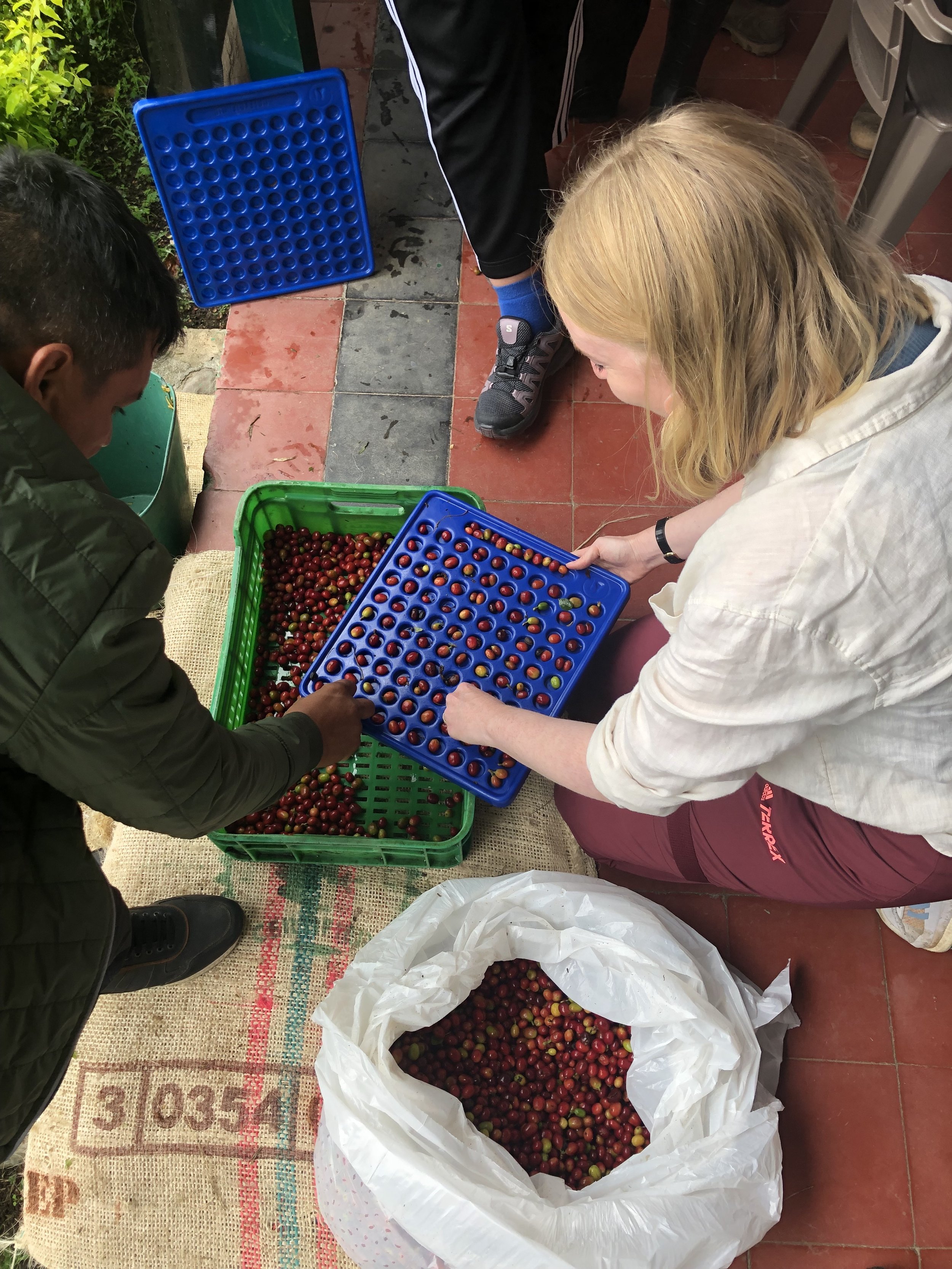Reflections on Plant to Port
Bee from Red Bank Coffee Roasters was an attendee on our first iteration of Plant to Port. Here she reflects on her time during the course in October 2023.
As I sat on the terrace at 1800 MASL, watching the thunderstorm move above the plains below us, I prepared myself for the next six days of intensive education from agronomic engineers, producers and exporters.
There are rare opportunities in life to learn about a multigenerational agronomic practice, direct from the producer themselves. Experts in their (coffee) fields.
We had just come off the farm tour of El Fénix, a community wet mill and educational coffee farm in Quindío, Colombia, led by our host, translator, and Head of Global Operations for Raw Material, Miguel Fajardo Mendoza. Deep in the fields of Wush Wush, Gesha and Pink Bourbon, we were asked to observe differences in tree shapes, soil types, cherry sizes, and branch distribution. Two days later, we would do the tour again, filled with the knowledge to identify cultivars, diagnose unhealthy plants, and understand the details of establishing and managing a productive field. In the classroom, Mario Gonzalez shared his expertise on the history of coffee in Colombia, and the varieties that grow here.
Travelling down the mountain and across to Chinchiná, we arrived at Jamaica drying station, perfectly positioned at a lower altitude and warmer climate for fermenting and drying crops from the hills of Villamaría. Here, Hernando Tapasco, agronomist and production consultant of Cafe y Procesos taught us about fermentation science, development and practices, measuring BRIX, and analog sample taking. We identified quality and yield to inform how the crop would be processed. It’s here that I learnt the major importance of careful drying. The effect it has on the final taste is more impactful than I had understood before.
This is just one of many light bulb moments for me as I digested information from these experts. Having the opportunity to be hands-on in the learning experience was fantastic. We used mini dry mills to extract the green from the parchment and calculate sample yields and prices.
Amongst the days of classroom and field based learning, we saw the landscape of Western Colombia and how the climate has changed in recent years. The impact on coffee production is significant. No more wet and dry seasons as blossom, ripe and unripe cherries line the branches all at the same time. Labour costs are increased as harvesting becomes a year round activity.
Waking up in Santuario, Risaralda, we headed for breakfast at Tienda Del Cafe, Asocafé Tatama. This cafe is owned and operated by Asocafé Tatama, and is part of their investment in youth education. The children of generational farming families work here with the opportunity to learn barista and brewing skills, to understand the supply chain beyond the field. Daniel Castaño transformed from Chemex brewing master to Asocafé Tatama educator, and presented us with the history and necessity of the association as we sat sipping coffee in their cupping lab. Here we had the opportunity to take real life samples from a fresh delivery, to assess the yield and value price for the promised crop. I stabbed the bag with a large hollow needle to extract enough parchment to mill and sort. Identifying ‘bad seeds’ from a sample in front of the producer himself was a nerve wracking endeavour. We took those samples to the lab to micro roast and cup for further pricing.
Exporter Juan Felipe Aristizabal of Invercafé, provided the details of the final and critical steps for green coffee over the five days before it, and the responsibility of it, is handed over to the shipping companies at port.
Coming home, I’m greeted with wide eyes and curious questions about the trip and everything I’ve learnt. How do I contextualise a unique learning experience and how it has impacted my deeper understanding of a product I've worked with for fourteen years? I’ve un-learnt and re-learnt processing labelling and furthered my understanding into the agronomic decision making. Knowledge is power and the details I have learnt will help customers develop their own understanding of the realities of coffee growing, and can impact the buying power down stream.
Enjoyed reading this? Keep up to date with Bee and the Red Bank team this way!









